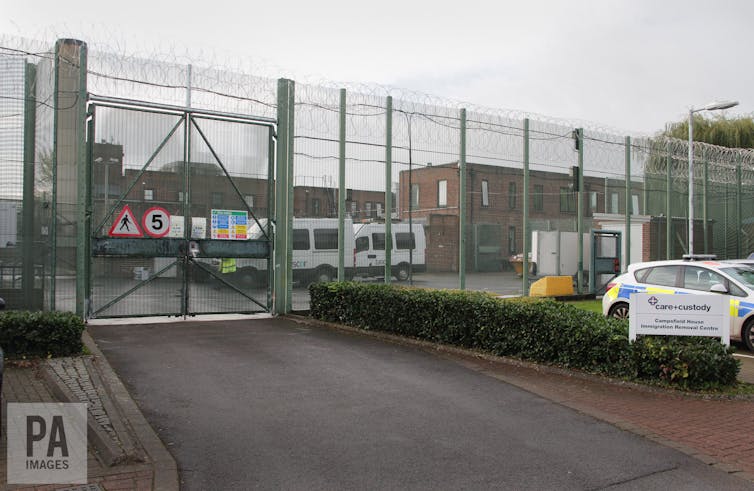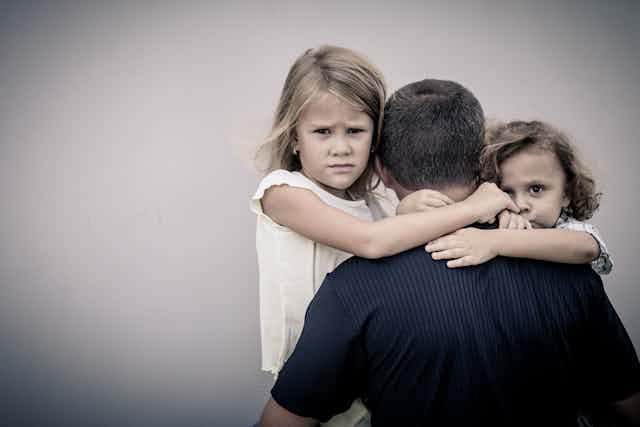Couples are being subjected to painful separations, uncertainty about their future and financial hardship by the UK’s strict immigration rules, according to our new research.
Between 2014 and 2017, we followed nearly 30 couples where the man had irregular or insecure immigration status in the UK but his partner or children were citizens of Britain or the European Economic Area (EEA).
While the partners and children were exempt from British immigration controls, the men – who came from countries as varied as Afghanistan and the US – had extremely precarious immigration status in the UK. This could have been due to temporary or overstayed visas, refused asylum claims, criminal records or because they entered the country illegally. This prohibits them from working, makes them vulnerable to immigration detention and expulsion, and subjects them to the everyday restrictions of Britain’s expanding “hostile environment” for migrants.
There are gender biases within immigration enforcement, with men making up 90% of those forcibly removed from the country and 85% of the nearly 28,000 people detained in British immigration removal centres each year.
Read more: Even before Brexit, Theresa May’s laws made Britain a hostile place for migrants
Impact on families
The impacts of such measures are felt by the whole family, not only the foreign nationals who have been targeted. By prohibiting these men from working, they were usually extremely dependant on their British or EEA partner. Those partners we interviewed were burdened by financial responsibility and frequently worked long hours and multiple jobs to support the whole family and pay the high costs of immigration applications and appeals. Some women even sacrificed their maternity leave in order to keep working, going against NHS advice about breastfeeding. The stresses produced significant physical and mental health for all family members and some children developed emotional, behavioural and educational problems.
The families all faced separation through the men’s immigration detention or forced removal from the country. Such separation can worsen financial hardship, as well as causing emotional harm and relationship damage. Partners were left in the UK as single parents, forcing some of those we interviewed out of work and on to welfare. One British woman, separated from the father of her child by the immigration system, demonstrated how financially crippling it can be to fall in love with a foreign partner. She said:
I was going somewhere once, big life plans… now I am completely dependent on my benefits and my savings have all gone on immigration stuff. Seven thousand pounds. That has all gone.
To their shock, many of the British and EEA women we spoke to had been advised by the Home Office that if they wished to live with their partner then they should move with him to the country of deportation.
Not all families are valued or even recognised by the immigration system. We found that Home Office decision makers were often suspicious of relationships involving British or European women and non-European men. The men were frequently accused of forming opportunistic relationships to bypass immigration controls. And yet, contrary to such stereotypes, the men interviewed were more likely than their partners to want to postpone relationships, marriage and children until their immigration problems were resolved. One man who had claimed asylum concluded: “People like us just shouldn’t fall in love.”
Read more: Broken families: what happens to couples torn apart by immigration rules
Precarious lives
Immigration battles also affect people’s sense of security and belonging and can transform the lives of citizens into ones more reminiscent of irregular migrants. Interviewees spoke about being trapped in limbo and being unable to move forward or imagine a future. A British woman, whose partner was detained for years, now panics when she sees immigration vans, while another lives with her suitcases packed in case she has to leave the country suddenly. One British woman even carries her passport with her in case of immigration checks.

All this affected how the women felt about being British, and the value they placed on citizenship. As one woman, whose foreign husband was held in immigration detention and subsequently removed, exclaimed to me:
I have lost faith in the country which I used to call home… I have lost trust. Every single bit of pride that I had to be calling myself a British citizen has almost gone out of the window.
Interviewees also reported that the experiences affected their children’s identities, and worried what the future impacts of this would be. As one mother told us:
My son doesn’t have any faith or trust in the government. He just doesn’t understand why his Dad can’t be here. He doesn’t class himself as a British citizen anymore.
Separated by the system
Unlike the rest of Europe, there is no maximum time limit on detention in the UK and the extreme uncertainty of the process and eventual outcome deeply affects whole families, not only those people detained.
In two other related policy briefings, we’ve called for a 28-day time limit to immigration detention and the use of community-based alternatives, as well as changes to Operation Nexus, a worrying initiative from the police and Home Office, designed to increase deportation of foreign national offenders.
Our research calls for fundamental change to the UK’s approach to immigration. For those families caught up in Britain’s increasingly hostile environment, everyday life is intensely difficult and the future may involve choosing between permanent separation and voluntary “exile”. Being a British citizen is no longer enough to protect you from the excesses of the immigration system.

